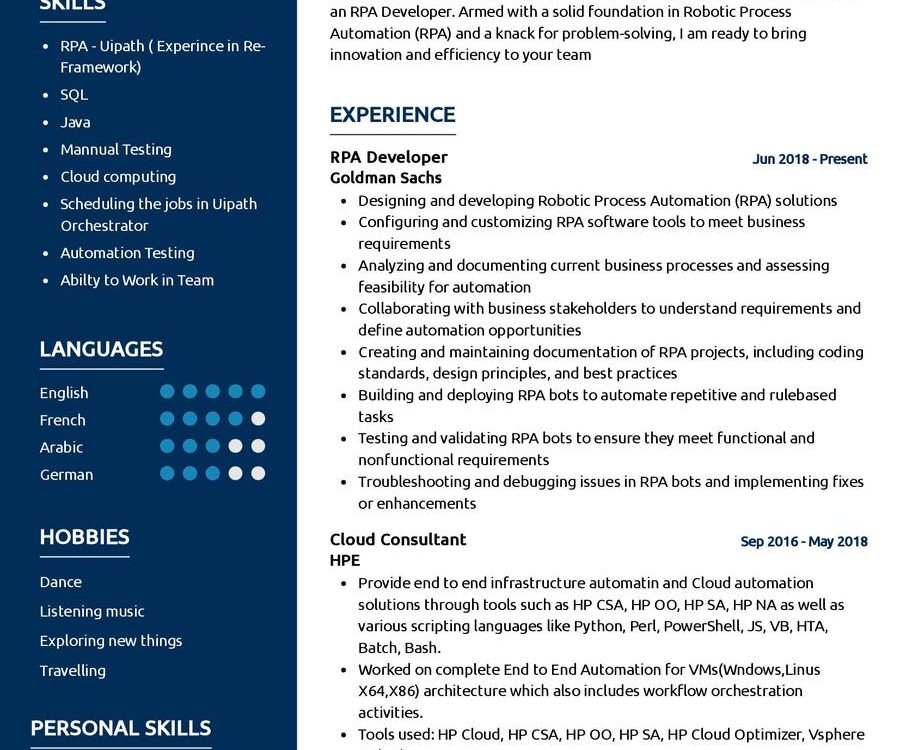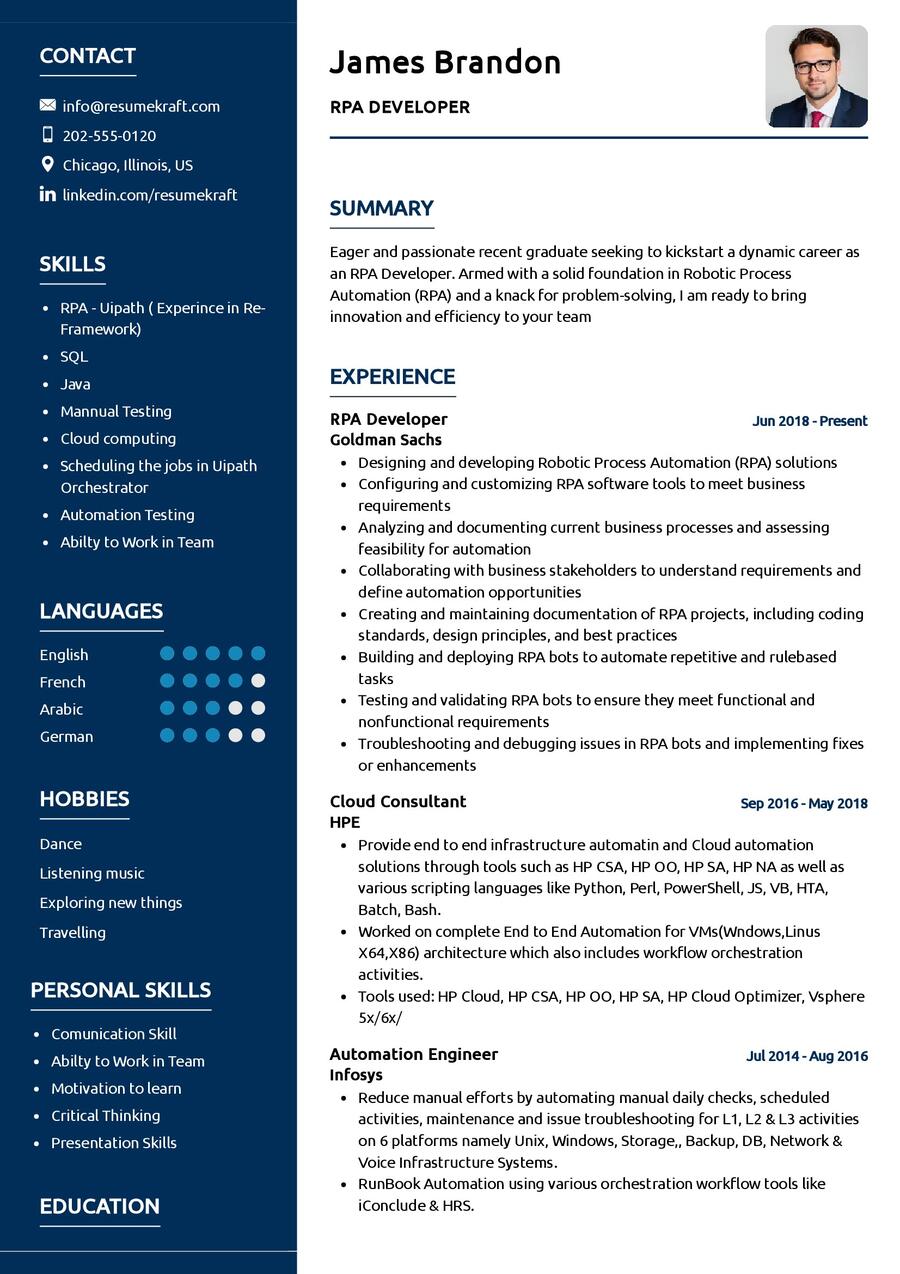Exploring the Role of an RPA Developer
As the demand for automation continues to reshape industries, the role of an RPA Developer has emerged as a key player in streamlining processes and boosting efficiency. This article delves into the multifaceted world of an RPA Developer, exploring the technical intricacies and leadership skills required for success in this dynamic field.
Requirements for an RPA Developer Position
Becoming an RPA Developer is a journey that demands a unique skill set and a solid educational foundation. Let’s delve into the prerequisites that one needs to fulfill to embrace the role of an RPA Developer:
- A Bachelor’s or Master’s degree in Computer Science, Information Technology, or a related field, showcasing a strong foundation in the technical domain.
- Proficiency in programming languages like Python, Java, or C#, with a focus on automation and process optimization.
- Hands-on experience in RPA tools such as UiPath, Blue Prism, or Automation Anywhere, demonstrating the ability to design and implement automated workflows.
- Strong analytical and problem-solving skills, essential for identifying opportunities for automation and developing effective solutions.
- Excellent communication skills to collaborate with cross-functional teams and stakeholders, translating business requirements into automated processes.
- Adaptability and a continuous learning mindset, given the rapid evolution of RPA technologies and methodologies.
Securing additional certifications in RPA technologies can enhance your profile in the competitive job market.
Responsibilities of an RPA Developer
The role of an RPA Developer is dynamic, requiring a blend of technical expertise and strategic vision. Let’s unravel the core responsibilities that define this role:
- Collaborating with business analysts and stakeholders to understand and document process requirements for automation.
- Designing, developing, and testing automated workflows using RPA tools, ensuring accuracy and efficiency in execution.
- Implementing and maintaining RPA solutions, troubleshooting issues, and optimizing processes for continuous improvement.
- Leading RPA projects, from conceptualization to deployment, and ensuring alignment with organizational goals.
- Providing training and support to end-users, fostering a culture of knowledge sharing and continuous improvement.
- Ensuring compliance with industry standards and best practices in RPA development.
- Staying updated with the latest developments in RPA technologies, guiding the team in adopting innovative solutions.
Each responsibility presents an opportunity for learning and growth, shaping you into an RPA leader.
RPA Developer CV Writing Tips
Crafting a compelling CV is crucial for landing your dream RPA Developer role. Here are some tips to help you showcase your skills and experiences effectively:
- Highlight your experience with specific RPA tools, detailing projects where you’ve successfully implemented automation solutions.
- Quantify your achievements, using metrics to showcase the impact of your RPA projects on process efficiency and business outcomes.
- Include relevant certifications in RPA technologies, demonstrating your commitment to staying updated in this rapidly evolving field.
- Customize your CV for the specific RPA Developer role, aligning your skills and experiences with the job description.
Your CV is your professional narrative, telling the story of your journey in the world of RPA development.
RPA Developer CV Summary Examples
Your CV summary is the opening act of your career story, setting the stage for what is to follow. Here are some examples to inspire you:
- “Results-driven RPA Developer with over 5 years of experience, adept at designing and implementing automation solutions that enhance operational efficiency and drive business growth.”
- “Innovative RPA Developer with a proven track record in leading end-to-end automation projects, leveraging advanced tools and methodologies for optimal results.”
- “Experienced RPA Developer skilled in collaborating with cross-functional teams to identify automation opportunities and streamline complex business processes.”
Your CV summary is a snapshot of your expertise and the value you bring as an RPA Developer.
Building Your RPA Developer Work Experience Section
Your work experience section is the core of your CV, narrating the story of your career in RPA development. Here are some examples to guide you:
- “Led a team in implementing UiPath-based automation, resulting in a 30% reduction in manual effort and a 20% increase in process efficiency.”
- “Pioneered the integration of Blue Prism for a complex financial process, reducing errors by 15% and ensuring compliance with industry regulations.”
- “Developed and conducted RPA training sessions for department members, enhancing overall team proficiency in automation tools.”
Each experience is a chapter in your RPA journey, showcasing your ability to drive positive outcomes.
Education Section for Your RPA Developer CV
Your educational background is the foundation of your RPA career. Here’s how you can list your educational milestones:
- Master of Science in Computer Science, XYZ University, a comprehensive education that laid the groundwork for my RPA expertise, 2017.
- Bachelor of Technology in Information Technology, ABC University, the stepping stone to my successful journey in RPA development, 2015.
- UiPath Certified RPA Developer, showcasing specialized knowledge in UiPath automation, 2018.
Your education is a testament to your dedication to mastering the skills required for RPA development.
RPA Developer Skills for Your CV
Your skill set is your toolbox, equipped with a diverse range of tools that you have honed over the years. Let’s list down the essential skills that an RPA Developer should possess:
Soft Skills:
- Analytical and critical thinking, essential for identifying and solving automation challenges.
- Communication and collaboration, facilitating effective interaction with stakeholders and team members.
- Attention to detail, ensuring precision in the design and execution of automated workflows.
- Adaptability and continuous learning, staying ahead in the ever-evolving field of RPA development.
Hard Skills:
- Proficiency in programming languages like Python, Java, or C#, crucial for developing automation scripts.
- Expertise in RPA tools such as UiPath, Blue Prism, or Automation Anywhere, showcasing hands-on experience in automation development.
- Process automation and optimization, the ability to streamline complex business processes for efficiency.
- Project management, overseeing end-to-end automation projects from conceptualization to deployment.
Each skill is a tool, aiding you in providing exceptional automation solutions and leading your team effectively.
Common Mistakes to Avoid When Writing an RPA Developer CV
As you craft your CV, it is crucial to steer clear of common pitfalls that can hinder your journey to landing your dream RPA Developer job. Here we list down the mistakes often seen in CVs and how to avoid them:
- Avoid generic statements; tailor your CV for the specific RPA Developer role you are applying for.
- Quantify your achievements to showcase the tangible impact of your RPA projects on business outcomes.
- Include relevant certifications to demonstrate your commitment to continuous learning and staying updated in the field.
- Proofread your CV thoroughly to ensure it is free from errors and presents a polished and professional image.
Each mistake is a potential obstacle; avoid them to craft a CV that is both authentic and compelling.
Key Takeaways for Your RPA Developer CV
As we reach the end of this comprehensive guide, let’s recap the key points to keep in mind while crafting your RPA Developer CV:
- Emphasize your experience with specific RPA tools and quantify the impact of your projects on process efficiency.
- Showcase your technical proficiency in programming languages and RPA technologies.
- Detail the strategic initiatives you have led, illustrating your visionary approach to RPA development.
- Include a section on continuous learning, showcasing relevant certifications and your commitment to staying updated in the field.
Finally, feel free to utilize resources like AI CV Builder, CV Design, CV Samples, CV Examples, CV Skills, CV Help, CV Synonyms, and Job Responsibilities to create a standout application and prepare for the RPA Developer job interview.
Armed with these insights and tips, you are now ready to craft a CV that is a true reflection of your journey, your skills, and your aspirations. Remember, your CV is not just a document; it is a canvas where you paint your career story, a story of growth, learning, and leadership. Best of luck!


